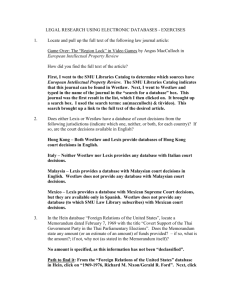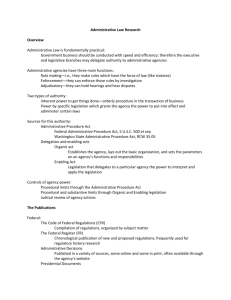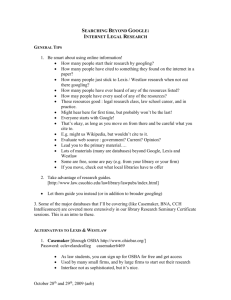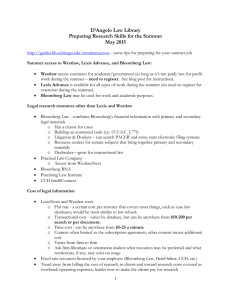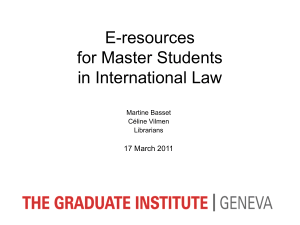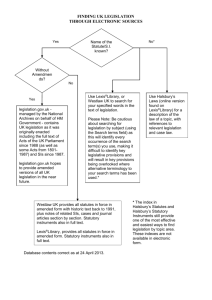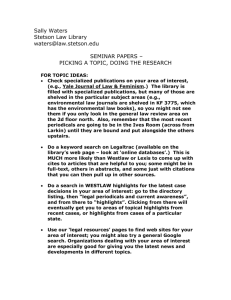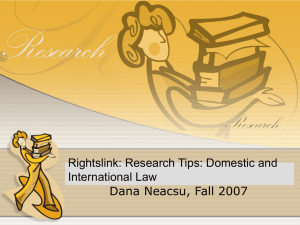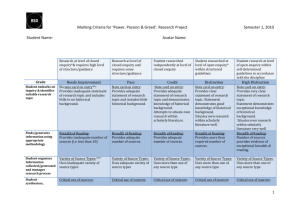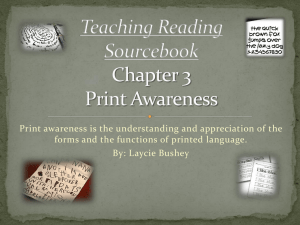Stepping Stones to Success in Your Law Assignment
advertisement
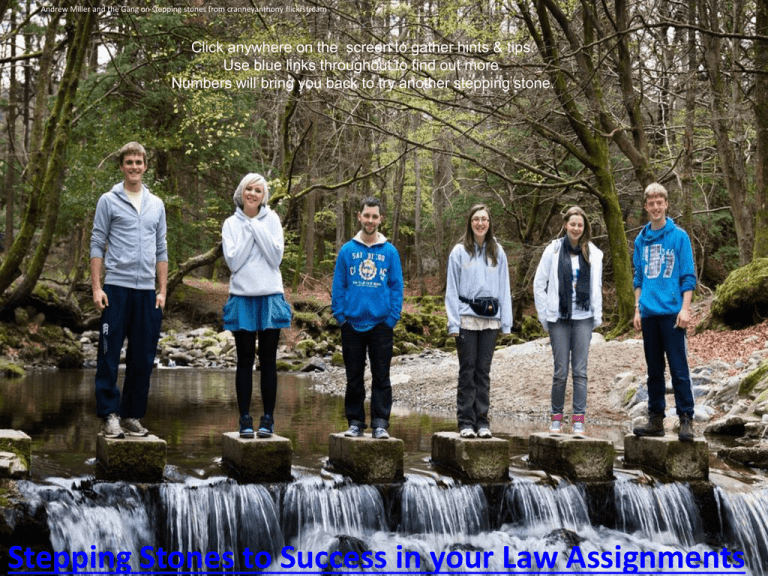
Andrew Miller and the Gang on stepping stones from cranneyanthony flickrstream Click anywhere on the screen to gather hints & tips. Use blue links throughout to find out more. Numbers will bring you back to try another stepping stone. Stepping Stones to Success in your Law Assignments Use the Help you are Given Lecturers devote an enormous amount of care and attention to your unit sites and handbooks it is silly not to use them. Reading lists particularly detailed week by week readings will give you lots of sources for your research. Your lectures and seminars will give additional guidance both on specific subjects and ways of tackling your research so do note what is said it may not appear in handouts. Read and Analyse the Question Make sure you understand the question, the library has specialist legal dictionaries to help but if you are unclear at this point make sure you contact your seminar tutor as early as possible. You must be clear about the area of law involved Look at the wording does the question require a totally academic, theoretical approach? In this case books and articles may be your main sources. OR Is it a problem question, skeleton argument etc. which requires a strictly legal approach? Then you need to rely on primary sources. Start with the Basics Whichever type of question start with a good textbook which gives you a general overview of the subject area. Try looking at a couple and relating them to any relevant lecture and seminar notes Look at the way they treat your topic then focus on key cases and legislation. Practice reading actively taking notes, questioning assumptions, checking your interpretations of legal terminology. Follow through on references Textbooks give you lots of leads to follow but if you go to the relevant primary sources in a good quality database you will find many more references. Evaluate everything you intend to use in your essay is this the best possible source for this specific purpose is up to date, has it been overturned, has it been amended, revised is it a legal or academic authority on the subject. Start writing Using the material you have found adopt a suitable structure and decide where and how you are going to use your best and most relevant sources. Initially you might find you have to re-check the sources as you get more experience you will make sure your notes include full references. Check each section is addressing the assignment question. If there are grey areas around interpretation make sure you have dealt with them. Check the sources you are referencing do they match what you decided would be your priority sources for this assignment? If not try strengthening your sources. Add the Finishing Touches Re-read the assignment instructions and check your layout and referencing are as requested. Use the library Referencing@Portsmouth tool to check how your footnote and in text citations should look. Take a break. Reread the assignment from start to finish and use those active reading skills to spot typos or flaws in reasoning, weakness in arguments. Amend where possible. Don’t get lost in the wood! If you feel you are not finding the right information or you can not access something the library is always there to help. Don’t drown in information! The secret of success is quality not quantity. Use the best sources available for the type of assignment you are doing. 0 Don’t Keep Circling the Same Maze Don’t concentrate on your mark. Collect and read your feedback. Ask your tutors about any feedback you don’t understand . Select one or two positive comments and look for strengths you can exploit in future assignments. Select one or two points to concentrate on improving in your next assignment. Seek appropriate help on research and referencing from the library. and on writing to an assignment from your Faculty Study Support Tutors or ASK. Click anywhere on the screen to gather hints & tips. Use blue links throughout to find out more. Numbers will bring you back to try another stepping stone 0 Articles are peer reviewed, i.e. the quality of the article has been reviewed by an editorial board. Use these when you know that you want very specific, academic information. They are published regularly, usually monthly or quarterly. They may be in printed or electronic format. You can use tools called databases to help you search the contents of these & other types of journal. If you are an undergraduate, you are unlikely to browse scholarly journals. Scholarly Journal Articles They contain articles, written by academics. The sources used to write the articles are included at the end in a Reference List or Bibliography. You can find scholarly articles in any subject area by searching Heinonline, Lexis , Westlaw Google Scholar Format may be printed or electronic. Use these when you want an introduction to a topic area. You are unlikely to read a book from cover to cover. Use the contents page & index to help you locate what you want to find out about. The book may be edited & divided into chapters which are written by different authors but relate to the main theme. Use your reading lists to find books recommended by your lecturer. Contact Study Support Tutors or ASK for help to develop active reading skills. They present well established ideas & theories & usually cover a broad topic area in considerable detail. Textbooks Textbooks are reviewed by an editorial board so you can trust that the content is reliable & accurate. Find out what books are available by searching the Discovery Service or COPAC . You may find some online ‘e-books’, using Ebrary, Dawsonera & MyiLibrary. Beauty of Reading from Law8r photostream The Union Flag 'Union Jack' UK Flag 326 from Ree Saunders photostream UK Legislation Acts are Primary legislation passed by Parliament. Statutory Instruments are Secondary legislation. Lexis, & Westlaw are good sources for current legislation as they incorporate changes in law as soon as possible & highlight if there are amendments pending. The latter also has a feature which can roll bank amendments but this stops at 1992. Acts & Statutory Instruments are Primary law sources referred to collectively as legislation. Every new piece of legislation impacts on previous legislation in the same area, Therefore you need to be absolutely clear whether you are looking at law as passed (historic law) or law as now enforced (current law) or law under discussion or scheduled for amendment (proposed law). BAILII & legislation.gov.uk are not as reliable for current legislation as they are still at varying stages of revision. The latter however helpfully provides a pdf of the original act so is useful for historic law. Law Reports Law Reports are Primary law sources for UK law but Secondary sources for EU law. UK Law Reports show the law in action & demonstrate how UK legislation is interpreted by the courts they can therefore influence later decisions. Find out more about law report series. how they are written, how to find them or the lighter side of law. EU Law Reports may include:Decisions which treat very specific cases & only bind those to whom they are addressed but may influence later legislation Recommendations & Opinions which have no binding force but do carry moral & political weight. BAILII is a useful source for official transcripts of cases so may have some information very quickly. Remember these are unedited & contain no helpful links to other cases or legislation nor do they indicate if a judgement has been overturned. Jordan's, Lexis & Westlaw each provide a range of law reports (including some European series). These have a number of editorial features, which are preferred by judges (ICLR in particular). Why worry? They also register later treatment of cases by judges. Heinonline provides access to the older English (or Nominate reports). These are a 178 volumes by named authors which cover cases back to 1220. Often confusingly abbreviated. Law Reports from onshi's photostream
